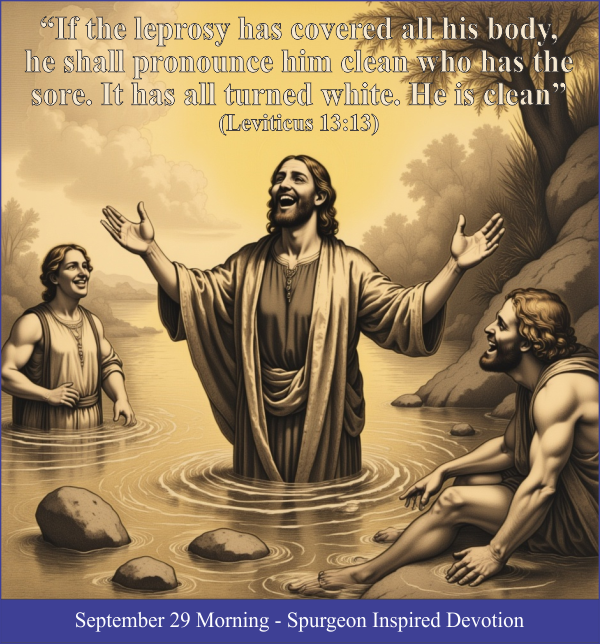
| September 29 Morning Devotion |
|
|
“If the leprosy has covered all his body, he shall pronounce him clean who has the sore. It has all turned white. He is clean” (Leviticus 13:13). This refers to common white leprosy, also called Dry Tetter. It disappears by itself, and isn’t the leprosy which disfigures. This regulation seems counter-intuitive, but there’s wisdom in it. As white patches spread, the disorder loses its contagious power by degrees, and exhausts itself. When the entire body is covered, there’s no possibility of danger, so the patient was declared clean by the priest, and restored to society. But there’s a spiritual lesson in this. Because we’re all sinners, we’re all spiritual lepers, and the law of the leper applies to us. When a man sees himself to be altogether lost and ruined, covered entirely with the defilement of sin, and no part free from pollution; when he recognizes he has no righteousness of his own, and pleads guilty before the Lord, then he can be declared clean by the blood of Christ. Unconfessed iniquity is leprosy, but when sin is seen and felt, it receives a death blow, and the Lord looks with mercy on the soul afflicted with it. Nothing is more deadly than self-righteousness, or more hopeful than repentance. “If we say that we have no sin, we deceive ourselves, and the truth is not in us. If we confess our sins, He is faithful and just to forgive us our sins and to cleanse us from all unrighteousness. If we say that we have not sinned, we make Him a liar, and His word is not in us” (1 John 1:8–10). If the Holy Spirit is working in us, we quickly acknowledge our sin and repent. What comfort this is for those under a deep sense of sin! Sin mourned and confessed, however black and foul, will never keep you from Christ. He said, “the one who comes to Me I will by no means cast out” (John 6:37). .
|
| 📧Get daily devotionals directly your email box.📧 |

|